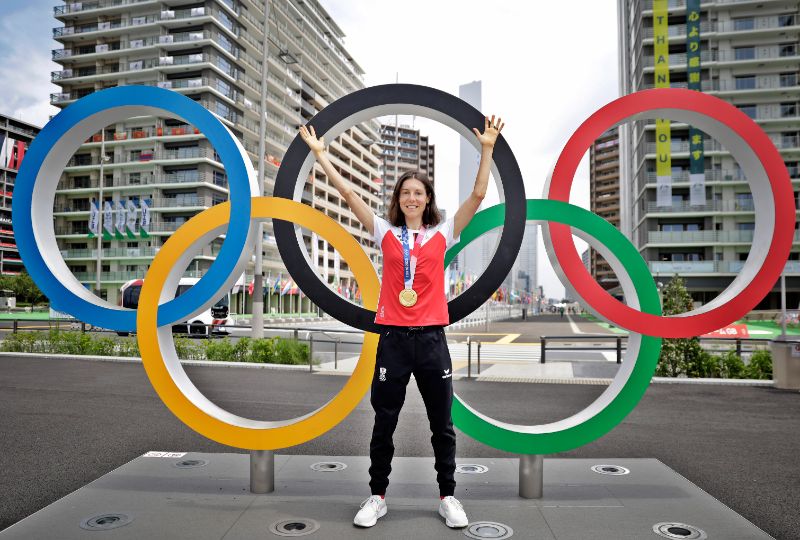Talented mathematician and cycling sensation
Anna Kiesenhofer’s greatest passion is mathematics. There is a drawing on her homepage: mathematical formulas are in the background. In front of them, there is an image of her, sitting upright in a victory pose on her racing cycle. Cycling is her second-greatest passion, and it took her to the Olympic Games in Tokyo in 2021. She describes herself as a “mathematician & cyclist. Born and raised in Austria. Living in Lausanne since 2017. Minimalist, introvert, attracted by the uncommon. Tokyo 2021 gold medal.” Her slogan is: “Dare to be different”. Different in order to achieve the unusual – that is something like the short formula of Anna Kiesenhofer’s life of thirty years so far.
It was initially characterised by her greatest passion, mathematics. Kiesenhofer chose to study this subject “because it is more exact than physics”. She graduated from the TU in Vienna with a bachelor’s degree and then graduated from the University of Cambridge with a master’s degree in “Pure Mathematics”; during this period, she was a keen triathlete. In 2016, science and sport moved closer together: at the Universitat Politècnica de Catalunya in Barcelona, Kiesenhofer was awarded a doctorate for her dissertation on “integrable systems on b-symplectic manifolds” with the top mark of “excellent cum laude”, studied “abstract mechanical systems which can be described in mathematical spaces” and “wanted to progress in the academic world”.
After an injury, she transferred her sporting ambitions to the bicycle and won her first national elite road race in Spain in the year she completed her doctorate. Sport became an increasingly important part of her life. She even signed a contract with a cycling team, but soon realised that “life as a professional athlete is not for me.” She thus progressed down the academic path, which seemed to be predestined for her, and started working as a scientific employee at EPFL in Lausanne because she could continue working there on her research focussed on partial differential equations at a first-class address and, as a postdoc, also teach on various Bachelor’s degree programmes. Another piece of the puzzle on the way to an academic career.
Then came the watershed year of 2021. After an internal elimination, she was given a starting place for the Olympic road race. The amateur was the only one to represent the colours of Austria, while other nations lined up with professional teams and half a dozen cyclists. Kiesenhofer competed all on her own: without a coach, without a team, relying only on her strengths and building on her own training plans, which she implemented with discipline, willpower and scientific meticulousness. And above all: she was aware of her above-average endurance. With this level of focus, she started the 137-kilometre race and was in the lead from the start to the finish.
“Three factors were decisive for my Olympic victory,” analyses Kiesenhofer soberly, “I attacked immediately and my opponents underestimated me, thinking they would catch up with and overtake me later in the race. However, I didn’t slow down and was able to make full use of my endurance.” And then, of course, she also had the necessary amount of luck on her side. The cycling world went wild with excitement. The American TV channel CNN wrote about Kiesenhofer: “A maths genius who just pulled off one of the biggest shocks in Olympics history.” The media shock waves reverberated all the way to the Times of India, the Arab Times and the China Daily Global, and in Austria she was named the “Sportswoman of the year”.
Her Olympic gold medal changed everything. She now receives the government funding for which her achievements before Tokyo had not been good enough. Now she can say with complete conviction what she had never dared to claim before: “I am a professional athlete.” What’s more: at EPFL in Lausanne, which is also the centre of her private life, her postdoctoral position has expired. And so professional sport is now her main focus. This does not mean that her academic ambitions have been completely forgotten.
The parallels between science and sport are too obvious for Kiesenhofer: both require passion, focus, precision and discipline. And in her sport of cycling, mathematics is always present as well. For instance, it is about aerodynamics or technical developments. About individual performance potential that can be optimised via modelling. What the CNN headline suggests is perhaps not even completely wrong: the fact that with Kiesenhofer a mathematician became the women’s Olympic road cycling champion is not only the result of an extraordinarily robust physique. And that is why it is also clear what she has in mind after her career as a professional athlete: she wants to get involved in sports science. “Then I will need something for my brain,” says Kiesenhofer knowingly. Or as it says on her website: “Dare to be different.”
